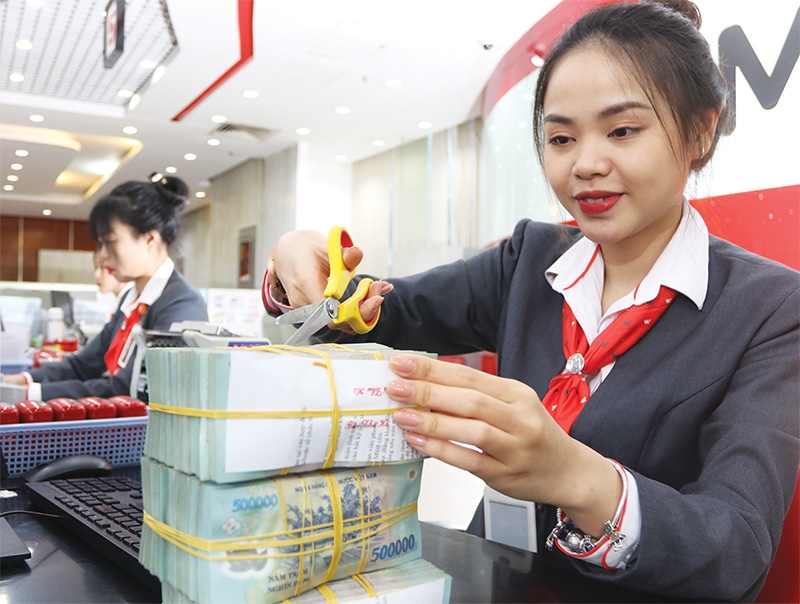PIT adjustments to amplify consumer spending
 |
| PIT adjustments to amplify consumer spending, illustration photo |
The National Assembly’s Standing Committee has officially approved the personal income tax (PIT) deduction based on dependents. Accordingly, the deduction for taxpayers will be raised from VND9 million ($390) to VND11 million ($480) per month, while the deduction for each dependent will be lifted from VND3.6 million ($160) to VND4.4 million ($190).
The new scheme is expected to be applied right away for this year’s tax period and aims to cushion distressed taxpayers in the face of a staggering economy. It is applicable for employment income only, not for capital gains and investment income.
According to Nguyen Tan Tai, manager of Tax and Corporate Services at Grant Thorton Vietnam, under the withholding mechanism, companies only collect taxes on behalf of local tax authorities as they are the source of income. That is to say, the change on tax deduction should bring benefits directly to individual taxpayers because it will ease the pressure for them, especially during the COVID-19 pandemic and the economic difficulties imposed by it.
In the long run, this policy can bring positive impacts to business, including foreign-invested enterprises (FIEs), as it can promote consumers’ spending due to an increase in their net earnings, and plays its part in driving up the economy.
“At Grant Thorton Vietnam, we will apply the new reduction when the new PIT deduction scheme is effective. The benefits of the new policy will go directly to our employees,” said Tai.
Nguyen Van Phung, director of the Department of Tax Administration at Large Enterprises from the General Department of Taxation, told VIR that PIT will be applied to all employees, including those who work for FIEs.
Accordingly, the new PIT deduction is applicable from January 1, 2020. Hence, for employers finalising PIT on behalf of their employees at the year-end tax period in 2021, if employees’ tax liability is less than the sum of tax paid during the year, they can claim a refund.
A representative from Everpia JSC, which runs the popular bedding brand Everon and entered Vietnam 25 years ago with factories in Hanoi, Hung Yen, and Dong Nai provinces, told VIR that the majority of its employees would benefit from the newly adopted PIT. “As a South Korean firm operating in Vietnam, we closely follow the Vietnamese tax policy. The deduction for taxpayers is consistent with market volatility and current economic struggles, and is a boon for our employees.”
The new measure, on the other hand, might have little spillover effects on some businesses which cover PIT for expats. WK Vina, an FIE focusing on construction, confirmed with VIR that salaries of its foreign employees will not be significantly affected since they are higher than the PIT deduction threhold.
Increasing deduction for PIT would lower tax revenue significantly. The Ministry of Finance estimates that if the proposal is implemented, the budget will lead to an approximate reduction of VND10.3 trillion ($448 million) in annual revenue. However, more than one million employees will avail themselves of the new relief measure. Furthermore, the deadline for payments of PIT will be extended to December 31, 2020 as per Decree No.41/2020/ND-CP dated April 8, which is applicable to individuals and business households working in the eligible business lines.
| Generally, there is no concession made for expatriates in Vietnam except for tax exemption on one-off relocation allowance for moving to Vietnam, determined based on the labour contract; school fees for expatriates’ children from kindergarten up to high school level paid in Vietnam supported with relevant documents (tuition only, and payment should be made directly to the school); airfares for one round trip home leave per year for expatriates supported with relevant documents (not applicable to family members); and compulsory insurance contributions in accordance with the regulations of the expatriate’s home country/territory. Accommodation of employees provided by employers is taxable based on the actual rental amount but not exceeding 15 per cent of total gross assessable income (excluding the housing benefit cost). In addition, benefits from houses built by the employer and provided by the employer free of charge for employees who are working in industrial zones, economic zones or in disadvantaged or severely disadvantaged areas, according to KPMG Vietnam’s website. |
What the stars mean:
★ Poor ★ ★ Promising ★★★ Good ★★★★ Very good ★★★★★ Exceptional
Related Contents
Latest News
More News
- Spring Fair 2026 boosts domestic demand (March 02, 2026 | 16:30)
- Law on Investment takes effect (March 02, 2026 | 16:21)
- Ho Chi Minh City attracts nearly $980 million in FDI in early 2026 (March 02, 2026 | 10:57)
- Businesses bouncing back after turbulent year (February 27, 2026 | 16:42)
- VinaCapital launches Vietnam's first two strategic-beta ETFs (February 26, 2026 | 09:00)
- PM sets five key tasks to accelerate sci-tech development (February 26, 2026 | 08:00)
- PM outlines new tasks for healthcare sector (February 25, 2026 | 16:00)
- Citi report finds global trade transformed by tariffs and AI (February 25, 2026 | 10:49)
- Vietnam sets ambitious dairy growth targets (February 24, 2026 | 18:00)
- Vietnam, New Zealand seek level-up in ties (February 19, 2026 | 18:06)

 Tag:
Tag:




















 Mobile Version
Mobile Version